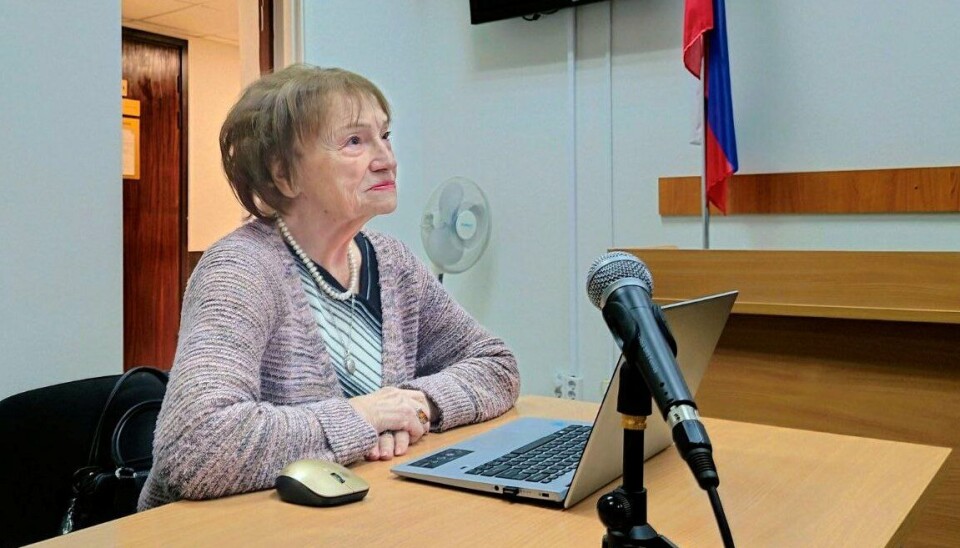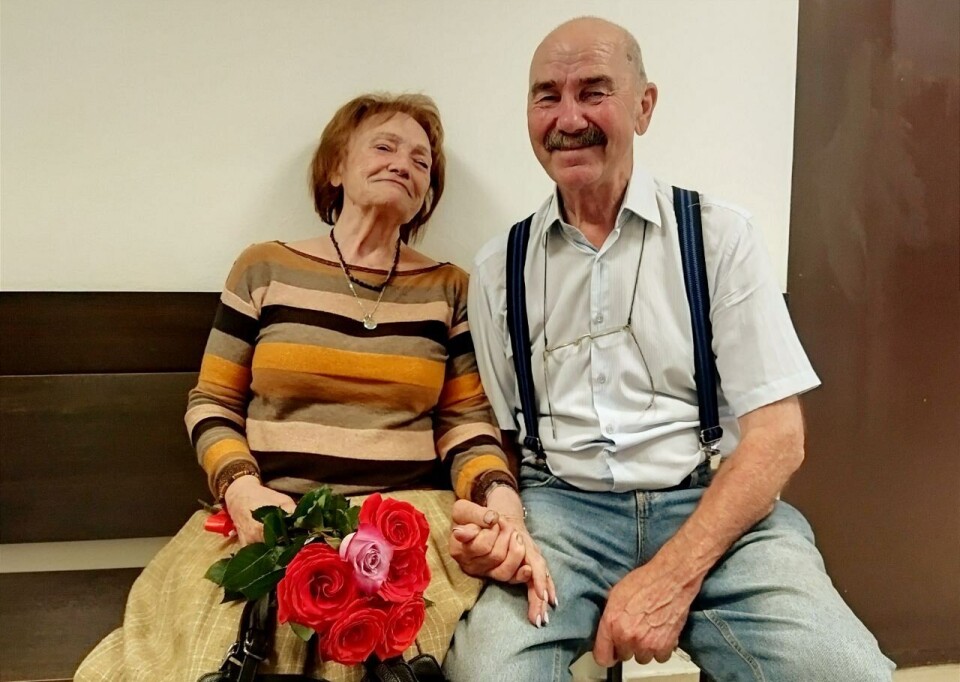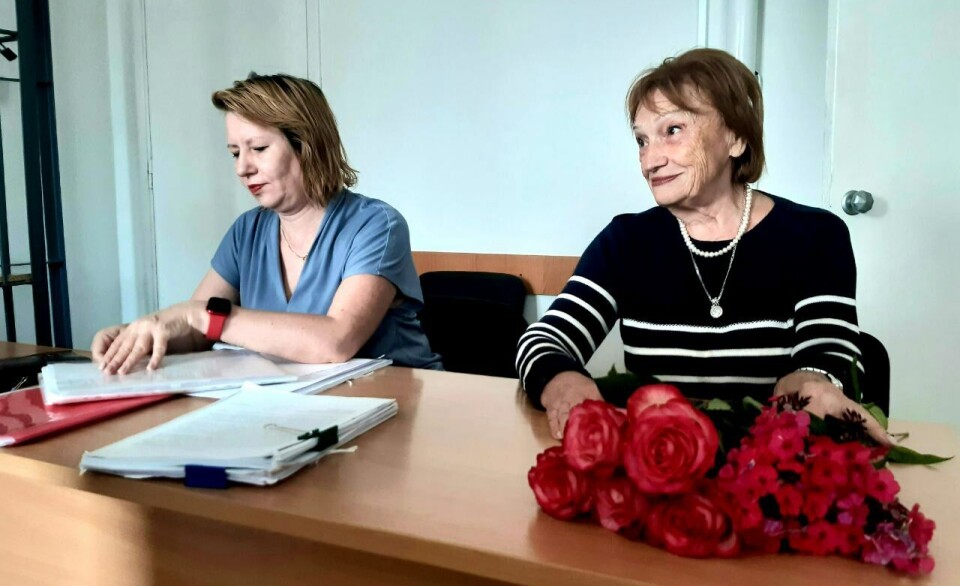
"I am ashamed of my country." 79 year old police veteran convicted for "discrediting" the Russian Army
Tatyana Savinkina from Petrozavodsk, Karelia, was accused of putting up anti-war leaflets in her entrance hall and got a 200,000 rubles fine for "discrediting" the Russian Army. The woman that used to work in the Ministry of Internal Affairs with the rehabilitation of victims of Soviet terror is now herself a victim of repression.
The sentence for Tatyana Savinkina was read out by Petrozavodsk City Court judge Stepan Sergeyev barely audibly, almost in a whisper. However, Savinkina's daughter heard that the marker, seized from her mother as evidence, was to be destroyed. It was with this marker that the pensioner allegedly wrote a leaflet in the spring of 2022 with the following content:
“75 thousand of our young guys returned to Russia in coffins. Half of Ukraine is devastated. I am very ashamed of my country, which is destroying the country where I was born and where my relatives still live today.”
The woman hung this leaflet in the entrance hall of her house, where it was seen and preserved for law enforcement by the head of the housing collective. She, along with the porter, later testified in court as a witness for the prosecution. The investigation and trial dragged on, but Savinkina refused to end her criminal prosecution due to the statute of limitations — and the court eventually reached a verdict. Savinkina was found guilty of discrediting the Russian army, sentenced to a fine of 200 thousand rubles (€1,900), but was immediately released from punishment.
The Barents Observer spoke with Savinkina about her case.
— Why did you refuse to drop the case?
— I didn't want to admit guilt because there was none. And I also didn't want to be found guilty. And they were shocked when I refused to drop the case. The judge didn't know what to do.
I'm not very happy that I have a criminal record. But I didn't and don't feel like a criminal. I feel like they are the criminals!
— When you were writing the leaflets, were you afraid of being punished for it?
— No, I wasn't afraid. It was the least of my worries.
— Many people are not ready to become victims of criminal or even administrative prosecution. How did you find the courage and strength to speak out against the war?
— To be honest, I spoke out not only against the war. I have always spoken out against many things, always had my own opinion — starting from school. I have always stood up for the truth.

Tatyana Savinkina is 79 years old. Her husband lived in Ukraine at the beginning of the full-scale invasion. Since February 2022, Savinkina has been fined several times for “discrediting” the army. In one case, she wrote the phrase “No to war” with a marker; this happened near the cemetery where the woman went to visit her son's grave. The violation was noticed by a ninth-grader who called her mother and followed the pensioner, not forgetting to take a photo for the police. In another case, Savinkina posted flyers in the entrance with the text “Putin, get out of Ukraine.”
— Who did you write these flyers for? Did you hope to change people's minds?
— Yes, exactly. I wanted people to see the truth. Because I heard — "It doesn't concern us, they are to blame themselves..." It was hard for me to believe that people were so indifferent to all this.
I didn't just put up these leaflets. I also put up leaflets with poems by Pushkin, Lermontov, Yevtushenko. So, at the trial, two concierges from our building pointed this out. And the judge asks: "What poems?" — "Well, Pushkin, Yevtushenko..." The judge just smiled.
— Do you live in the same building as the informers? What is your relationship with your neighbors?
— The head of the housing collective and the concierge testified in court, claiming that people were outraged by the leaflets. In reality — not a single person! I have very good relationships in the building, no one said a word.
— You were fined several times, money for paying the fines was collected by the whole world, and the collected amounts were more than the fines. What happened to this money?
— It started when a woman from Lahdenpohja called me. She found out that money was being collected for me to pay the fine and asked for help because she was also fined for discreditation. I did so, but most of the money — I think, 380 thousand — I sent to an organization that helps political prisoners. They even contacted me and said that I should think carefully, that they could send the money back; but I said — no, this money should be used as intended.

For more than thirty years, Tatyana Savinkina worked in the Ministry of Internal Affairs, she holds the rank of police major. In the last years before her dismissal, Savinkina worked in a department that collected information about the repressed. She continued to work on the rehabilitation of victims of repression in retirement.
— You are a person who dealt with the memory of repressions and ended up being repressed yourself; what do you think about this?
— I am surrounded by many friends: bright, kind people. I didn't even know many of them until we met during Dmitriev's case [political prisoner Yuri Dmitriev - Ed.] and became very close. If it weren't for them, I probably wouldn't have endured. Because it was very difficult, believe me.
— What was the hardest part?
— It was very sad when close friends — school friends, for example, who were always dear to me — slowly drifted away after encountering my case. It was painful. And it still hurts.
— What did you feel when the persecution against you began?
— I was ashamed of my country. I am being punished for what I must say!
— What do you think the law enforcement officers you encountered think? Do they understand they are participating in repression? Are there many "ideological" ones among them?
— The investigator [of the investigative department of the Ministry of Internal Affairs, Olga Solovyova] is a young girl, I am so ashamed of her... She sent my leaflet for examination to four cities to find any discreditation in it. She was a lieutenant; when I saw how she was handling my case, I told her — "By the end, you will definitely be a captain." And you know, she really is a captain!
The police have their own views on this — close to what the state is doing. Those I worked with — many call me and say: "Hang in there, Tanya." Among them are active officers. But they can't say it openly anywhere.
And in my building, there lives a retired colonel. He once met me, hugged me, and said: “Hang in there!”
— Nowadays, it's impossible to imagine a police officer doing what you did in the Ministry of Internal Affairs — rehabilitation. But there was such a time! At what point did our country take the wrong turn?
— When the country started being led by KGB officers headed by Putin. Even when Yeltsin was there, there were some hopes. But when the KGB officer came, I somehow immediately understood that nothing good could be expected.
In 2007, I went on a business trip to St. Petersburg. I heard there would be a rally and asked to be taken there. And there [people were being detained]. And they took me too. I was so scared that I told those riot police officers: “Guys, let me go, I'm one of you.” And they let me go. And then on the front page of “Novaya Gazeta” — a photo: two big guys are leading me, and I look so scared… The article was titled — “On the First Day of Totalitarianism.”















